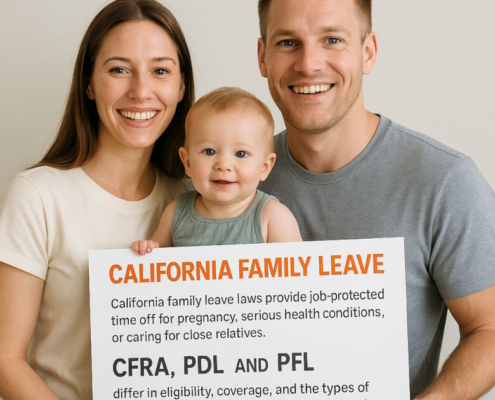Introduction to California Employee Laws
California is famous for its strong employee protection laws that are intended to provide fair treatment, equal opportunity, and safe working conditions to all workers. In this article, we will take a deeper look at the different types of employment laws in California that protect the rights and wellbeing of employees. Employees law in California are enforce by the Department of Industrial Relations. This comprehensive overview aims to shed light on the complexities and the scope of employee laws in California. If you have any questions concerning employee laws, please contact our employment law attorney in California.
Wage and Hour Laws
Wage and hour laws in California are essential in ensuring that employees receive reasonable remuneration and reasonable working hours. The state’s minimum wage is actually one of the highest in the country and stands at $ 14 per hour for businesses with 26 or more employees and $ 13.00 per hour for businesses with 25 or less employees (California Labor Code Section 1182.12). Moreover, California requires overtime compensation for any additional work beyond 8 hours per day or 40 hours per week (California Labor Code Section 510). These California laws that pertain to the workers are geared toward eliminating exploitation and ensuring that the workers get fair rewards for their labour. The employee laws in California thus play a pivotal role in promoting fair wage practices.
Workplace Safety Laws
Also, employers in the State of California are obliged to provide safe and healthy working environments for their workers. The Division of Occupational Safety and Health (Cal/OSHA) is responsible for workplace safety laws, such as the use of the regulation mechanism to establish and implement safety and health standards to avoid accidents injuries and sickness at the workplace. These policies span across many facets including appropriate equipment use, hazard communication, emergency action plans, and employee training – California Labor Code Section 6300 et seq. Law in California grants value to workplace safety in an effort to safeguard workers from harm that is otherwise avoidable and ensure that they are doing well. Employee laws in California thus underscore the importance of a secure and healthy work environment.
Anti-Discrimination Laws
California’s anti-discrimination laws offer broad protection against discrimination at the workplace based on a range of protected classifications. FEHA does not allow discrimination on such bases for race, color, national origin, ancestry, religion, gender, gender identity, sexual orientation, age, disability and medical condition, genetic information, marital status, and military and veteran status (California Government Code Section 12940). The employee laws in California are designed to ensure that the work environment is fair and that employees are hired on the basis of their abilities and not some of their personal characteristics. This demonstrates the commitment of employee laws in California to uphold equality and prevent workplace discrimination.
Learn more: Types of Discrimination In the Workplace
Harassment and Workplace Bullying Laws
California has a strict policy when it comes to workplace harassments and bullies as they can negatively impact employees’ mental and emotional state. Employers must provide a workplace free from any form of harassment, including sexual harassment and abusive conduct (California Government Code Section 12940)… These laws guarantee the rights of employees to carry out their responsibilities without the fear of abuse or intimidation thereby creating a respectful and productive work atmosphere. Employee laws in California are therefore instrumental in fostering a respectful and harassment-free workplace.
Learn more:
Family and Medical Leave Laws
California understands the significance of family and medical needs and offers employees leave protections. These California employees laws aim at promoting the work-life balance and ensuring employees can take care of their personal and family needs without the fear of losing employment. The employee laws in California recognize and support the need for a healthy balance between work and personal life.
Learn more:
Whistleblower Protections
Whistleblower protections in California protect employees that report illegality, non-compliance, or violations of regulation within their employer’s organization. In addition, these laws make it illegal for employers to retaliate against employees who attempt to exercise their right to report these kinds of misconduct (California Labor Code Section 1102.5). Seeking information from employees, these employee laws in California foster transparency, accountability, and general respectability of workplaces. California’s employee laws thus encourage a culture of openness and ethical conduct in the workplace.
Privacy Laws
California recognizes the employees’ right to privacy and enacted laws to help them escape from unwarranted intrusion. These types of privacy laws include curbs on employer surveillance, controls on how personal information can be collected and handled, and demands on providing notice and consent for certain activities (California Labor Code Section 980, California Civil Code Section 1798.90 et seq.). California laws governing these employees ensure that employees are empowered to control their personal information and they still can enjoy a reasonable expectation of privacy at the workplace. Thus, employee laws in California play a crucial role in protecting the privacy rights of workers.
Fair Employment and Housing Act (FEHA)
FEHA is a very inclusive statute that takes broad measures to prevent discrimination, harassment, and retaliation in employment (California Government Code Section 12940). FEHA makes it illegal for employers to practice discrimination and requires providing reasonable accommodations for employees who have certain disabilities or religious beliefs (California Government Code Section 12940, California Government Code Section 12945). These California employee laws encourage equal opportunities and create a tolerant workplace. FEHA is a cornerstone of employee laws in California, promoting inclusivity and fairness.
Paid Sick Leave
As per California law, employers have to offer paid sick leave to employees (California Labor Code Section 246). This ensures that workers can afford to be out when sick or when taking care of a sick family member. California laws that give priority to the health and welfare of workers and prevent the spread of an illness at the workplace. Paid sick leave provisions are a significant aspect of employee laws in California, underscoring the importance of employee health and welfare.
Learn more:
Worker’s Compensation Laws
California worker’s compensation laws provide that employees are entitled to benefits when they suffer injuries or diseases arising from activities at the workplace. 3 These laws offer medical care, income replacement, and rehabilitation assistance to workers who develop occupational diseases or injuries (California Labor Code Section 3200 et seq.). This is the reason as to why employees law in California has provided these protections so that workers are not left in a financially burdened condition because of workplace accidents or occupational diseases. Employee laws in California thus ensure comprehensive protection and support for workers facing workplace injuries or illnesses.
Final Paycheck Laws
In every state, there are certain requirements concerning when an employer has to deliver a final paycheck to an employee who is leaving or being let go. Generally, an employer has to provide the final paycheck as soon as an employee is fired from the position or within 72 hours if an employee quits without giving any notice (California Labor Code Section 201, California Labor Code Section 202). These laws related to employees ensure that employers in California do not deprive their employees of their wages and that employees receive their due payments promptly. Thus, these employee laws in California play a vital role in safeguarding employees’ financial rights at the time of separation.
Learn more:
Disability Laws
California disability laws are geared towards the protection of employees with disabilities and those that have taken a leave due to disability-related reasons but have returned to work. These laws make it a requirement for employers to award reasonable accommodation to qualified people with disabilities who can perform the basic job duties (California Government Code Section 12926, California Government Code Section 12940). These employees laws in California lead to inclusivity and diversity in the workplace by providing equal opportunities for the individuals with disabilities. Employee laws in California thus demonstrate a strong commitment to disability rights and workplace inclusiveness.
Leave Laws for Victims of Domestic Violence, Stalking, or Sexual Assault
California acknowledges the victims of domestic violence, stalking, and sexual assault and provides protections in the form of leave to these individuals. Employees who become victims of such crimes have the right to take time off to receive medical attention, to use law services, and to participate in safety planning etc. Per California Labor Code Section 230 et seq. The employees laws in California are designed with the view to help victims and provide victims with the necessary resources to recover and protect their well-being. This aspect of employee laws in California emphasizes the state’s dedication to supporting victims and ensuring their safety and recovery.
Retaliation Protections
Employees in California are shielded from retaliation when they exercise their rights under employment laws. Employers cannot retaliate against employees who exercise their rights or participate in investigations or legal proceedings (California Labor Code Section 1102.5). Employee laws in California guarantee that employees can exercise their rights without incidence of repercussion, promoting a climate of responsibility and equity. The employee laws in California thus ensure a just and fair treatment of employees, enhancing their confidence in exercising legal rights.
Learn more:
Labor Union Laws
In California, there are laws guiding the relationship between labor unions, employees, and employers. These legislative provisions support employees’ rights to organize themselves, engage in collective bargaining, and participate in union activities without bother from employers (California Labor Code Section 923). Employee laws in California empower these workers to negotiate for better pay, benefits, and working conditions through promoting collective action. California’s employee laws hence play a crucial role in strengthening labor rights and encouraging collective bargaining.
Conclusion
California employment laws establish a rich framework for addressing employers’ obligations to employees’ rights and promoting equality and safety at work. From wage and hour laws to anti-discrimination regulations, the state has enacted a strong set of statutes in order to protect employees’ welfare. By supporting these laws that protect employees in California, employers and employees can collaborate to establish a just, respectful, and productive workplace. This article has thus provided a comprehensive understanding of the various facets of employee laws in California, highlighting their significance in ensuring a balanced and fair work environment.































